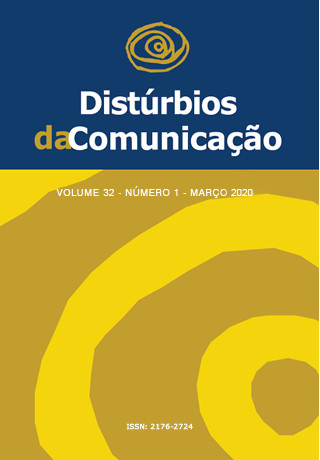Itinerário terapêutico da criança surda na rede de atenção à saúde
DOI:
https://doi.org/10.23925/2176-2724.2020v32i1p73-86Palavras-chave:
Deficiência Auditiva, Surdez, Reabilitação, Sistema de SaúdeResumo
Introdução: Na criança, a existência da deficiência auditiva é ainda mais preocupante que no adulto ou idoso, devido à interferência no processo de aquisição e desenvolvimento da linguagem. Por esse motivo, é preciso que haja uma rede de atenção à saúde organizada de modo a oferecer diagnóstico e intervenção rapidamente. Objetivo: Analisar a atenção à saúde auditiva infantil a partir do itinerário terapêutico (IT) de uma criança surda usuária de um Centro de Reabilitação Auditiva. Método: A pesquisa, de natureza qualitativa e do tipo estudo de caso, foi realizada tomando-se como ponto de partida um município da região de Campinas/SP, os serviços da rede municipal de saúde e referências regionais. Foi feita entrevista em profundidade com a mãe da criança para reconstituição do IT e 10 entrevistas semiestruturadas com gestores e profissionais para obter informações sobre a linha de cuidado à saúde auditiva. Resultados: A maternidade foi um importante ponto de atenção para detecção precoce da deficiência auditiva, porém há falhas no protocolo de triagem utilizado por ela. O Centro de Reabilitação cumpria com seu papel, mas foi apontada a necessidade de serviços de reabilitação nas cidades de origem dos usuários. Houve problemas na coordenação do cuidado da Unidade Básica de Saúde de referência para a criança surda. Conclusão: A reconstituição do IT foi uma importante ferramenta para analisar a integralidade na atenção à saúde, permitindo compreender a trajetória real do usuário na busca por cuidado, permitindo que se conheça e como funciona a rede real de atenção à saúde.
Downloads
Downloads
Publicado
Edição
Seção
Licença
Copyright (c) 2020 Nubia Garcia Vianna, Maria Cecília Marconi Pinheiro Lima, Maria da Graça Garcia Andrade

Este trabalho está licenciado sob uma licença Creative Commons Attribution 4.0 International License.









